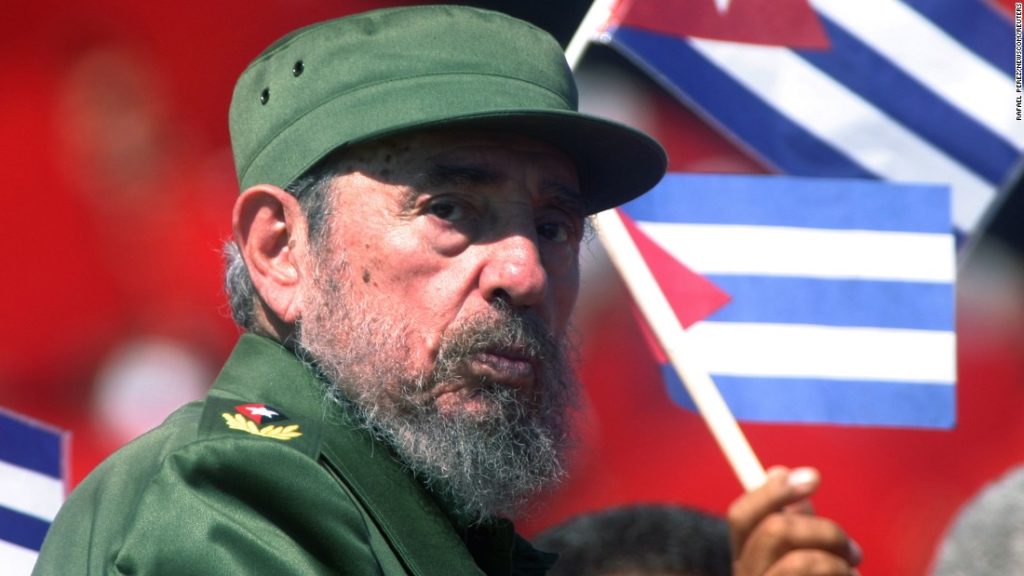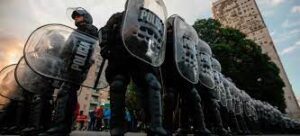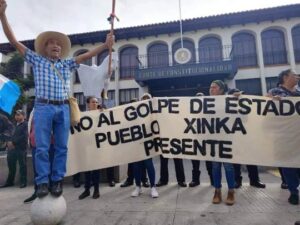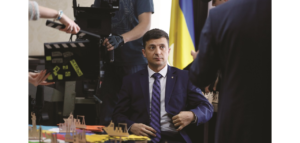Text of a speech given by Dr. Fidel Castro Ruz, President of the Republic of Cuba, at the May Day rally held in Revolution Square on May 1, 2003 (Note from Editors: Speech has been edited by us for reasons of space.)
Distinguished guests, Dear fellow Cubans:
Our heroic people have struggled for 44 years from this small Caribbean island just a few miles away from the most formidable imperial power ever known to mankind. In so doing, they have written an unprecedented chapter in history. Never has the world witnessed such an unequal fight.
Some may have believed that the rise of the empire to the status of the sole superpower, with a military and technological might with no balancing pole anywhere in the world, would frighten or dishearten the Cuban people. Yet, today they have no choice but to watch in amazement the enhanced courage of this valiant people. On a day like today, this glorious international workers’ day, which commemorates the death of the five martyrs of Chicago, I declare, on behalf of the one million Cubans gathered here, that we will face up to any threats, we will not yield to any pressures, and that we are prepared to defend our homeland and our Revolution with ideas and with weapons to our last drop of blood.
What is Cuba’s sin? What honest person has any reason to attack her?
With their own blood and weapons seized from the enemy, the Cuban people overthrew a cruel tyranny with 80,000 men under arms imposed by the US government.
Cuba was the first territory free from imperialist domination in Latin America and the Caribbean, and the only country in the hemisphere, throughout post-colonial history, where the torturers, murderers and war criminals that took the lives of tens of thousands of people were exemplarily punished.
All of the country’s land was recovered and turned over to the peasants and agricultural workers. The natural resources, industries and basic services were placed in the hands of their only true owner: the Cuban nation.
In less than 72 hours, fighting ceaselessly, day and night, Cuba crushed the Bay of Pigs mercenary invasion organised by a US administration (in 1961), thereby preventing a direct military intervention by the US and a war of incalculable consequences. The Revolution already had the Rebel Army, over 400,000 weapons and hundreds of thousands of militia members. In 1962, Cuba confronted with honour, and without a single concession, the risk of being attacked with dozens of nuclear weapons.
It defeated the dirty war that spread throughout the entire country, at a cost in human lives even greater than that of the war of liberation. It stoically endured thousands of acts of sabotage and terrorist attacks organised by the US government. It thwarted hundreds of assassination plots against the leaders of the Revolution.
While under a rigorous blockade and economic warfare that has lasted for almost half a century, Cuba was able to eradicate in just one year the illiteracy that has still not been overcome in the course of more than four decades by the rest of the countries of Latin America, or the United States itself.
It has brought free education to 100% of the country’s children. It has the highest school retention rate—over 99% between kindergarten and ninth grade—of all of the nations in the hemisphere. Its elementary school, students rank first worldwide in the knowledge of their mother language and mathematics. The country also ranks first worldwide with the highest number of teachers per capita and the lowest number of students per classroom.
All children with physical or mental challenges are enrolled in special schools.
Computer education and the use of audio-visual methods now extend to all of the country’s children, adolescents and youth, in both the cities and the countryside.
All citizens have the possibility of undertaking studies that will take them from kindergarten to a doctoral degree without spending a penny.
Today, the country has 30 university graduates, intellectuals and professional artists for every one there was before the Revolution. There are schools for the training of artists and art instructors throughout all of the country’s provinces, where over 20,000 young people are currently studying and developing their talent and vocation. Tens of thousands more are doing the same at vocational schools, and many of these then go on to undertake professional studies.
University campuses are progressively spreading to all of the country’s municipalities. Never in any other part of the world has such a colossal educational and cultural revolution taken place as this. It will turn Cuba, by far, into the country with the highest degree of knowledge and culture in the world, faithful to Martí’s profound conviction that “no freedom is possible without culture”.
Infant mortality has been reduced from 60 per 1000 live births to a rate that fluctuates between 6 and 6.5, which is the lowest in the hemisphere, from the United States to Patagonia. Life expectancy has increased by 15 years.
Infectious and contagious diseases like polio, malaria, neonatal tetanus, diphtheria, measles, rubella, mumps, whooping cough and dengue have been eradicated; others like tetanus, meningococcal meningitis, hepatitis B, leprosy, hemophilus meningitis and tuberculosis are fully controlled. Today, in our country, people die of the same causes as in the most highly developed countries: cardiovascular diseases, cancer, accidents and others, but with a much lower incidence.
A profound revolution is underway to bring medical services closer to the population, in order to facilitate access to health care centers, save lives and alleviate suffering. In-depth research is being carried out to break the chain, mitigate or reduce to a minimum the problems that result from genetic, prenatal or childbirth-related causes.
Cuba is today the country with the highest number of doctors per capita in the world, with almost twice as many as those that follow closer. Cubans have the best healthcare system in the world, and will continue to receive all services absolutely free of charge.
Social security covers 100% of the country’s citizens.
In Cuba, 85% of the people own their homes and they pay no property taxes on them whatsoever. The remaining 15% pay a wholly symbolic rent, which is only 10% of their salary.
Illegal drug use involves a negligible percentage of the population, and is being resolutely combated. Lottery and other forms of gambling have been banned since the first years of the Revolution to ensure that no one pins their hopes of progress on luck.
There is no commercial advertising on Cuban television and radio or in our printed publications. Instead, these feature public service announcements concerning health, education, culture, physical education, sports, recreation, environmental protection, and the fight against drugs, accidents and other social problems. Our media educate, they do not poison or alienate. They do not worship or exalt the values of decadent consumer societies.
There is no cult of personality around any living revolutionary, in the form of statues, official photographs, or the names of streets or institutions. The leaders of this country are human beings, not gods.
In our country there are no paramilitary forces or death squads, nor has violence ever been used against the people; there are no extrajudicial executions or torture. The people have always massively supported the activities of the Revolution. This rally today is proof of that.
Light years separate our society from what has prevailed until today in the rest of the world. We cultivate brotherhood and solidarity among individuals and peoples both in the country and abroad.
The new generations and the entire people are being educated about the need to protect the environment. The media are used to build environmental awareness.
The development of wholesome, non-professional sports has raised our people to the highest ranks worldwide in medals and honors.
Scientific research, at the service of our people and all humanity, has increased several-hundredfold. As a result of these efforts, important medications are saving lives in Cuba and other countries.
In no other people has the spirit of international solidarity become so deeply rooted.
Our country supported the Algerian patriots in their struggle against French colonialism, at the cost of damaging political and economic relations with such an important European country as France. We sent weapons and troops to defend Algeria from Moroccan expansionism, when the king of this country sought to take control of the iron mines of Gara Djebilet, near the city of Tindouf, in southwest Algeria.
At the request of the Arab nation of Syria, a full tank brigade stood guard between 1973 and 1975 alongside the Golan Heights, when this territory was unjustly seized from that country.
The leader of the Republic of Congo when it first achieved independence, Patrice Lumumba, who was harassed from abroad, received our political support. When he was assassinated by the colonial powers in January of 1961, we lent assistance to his followers. Four years later, in 1965, Cuban blood was shed in the western region of Lake Tanganyika, where Che Guevara and more than 100 Cuban instructors supported the Congolese rebels who were fighting against white mercenaries in the service of the man supported by the West, that is, Mobutu, whose 40 billion dollars that he stole—nobody knows in which European banks they are kept.
The blood of Cuban instructors was shed while training and supporting the combatants of the African Party for the Independence of Guinea and Cape Verde, who fought under the command of Amilcar Cabral for the liberation of these former Portuguese colonies.
The same was true during the ten years that Cuba supported Agostinho Neto’s MPLA in the struggle for the independence of Angola. After independence was achieved, and over the course of the next 15 years, hundreds of thousands of Cuban volunteers participated in defending Angola from the attacks of racist South African troops that in complicity with the United States, and using dirty war tactics, planted millions of mines, wiped out entire villages, and murdered more than half a million Angolan men, women and children.
In Cuito Cuanavale and on the Namibian border, to the southwest of Angola, Angolan and Namibian forces together with 40,000 Cuban troops dealt the final blow to the South African troops. This resulted in the immediate liberation of Namibia and speeded up the end of apartheid by perhaps 20 to 25 years. At that time, the South Africans had seven nuclear warheads that Israel had supplied to them or helped them to produce, with the full knowledge and complicity of the US government.
Throughout the course of almost 15 years, Cuba had a place of honour in its solidarity with the heroic people of Vietnam, caught up in a barbaric and brutal war with the United States. That war killed four million Vietnamese, in addition to all those left wounded and mutilated, not to mention the fact that the country was inundated with chemical compounds that continue to cause incalculable damage even today. The pretext for the US invasion: Vietnam, a poor and underdeveloped country located 20,000 kilometers away, constituted a threat to the national security of the United States.
Cuban blood was shed together with that of citizens of numerous Latin American countries when Che Guevara was murdered on instructions from US agents in Bolivia, when he was wounded and being held prisoner after his weapon had been rendered useless by a shot received in battle.
The blood of Cuban construction workers, who were building an international airport vital for the economy of a tiny island fully dependent on tourism, was shed fighting in defense of Grenada, invaded by the United States under cynical pretexts. Cuban blood was shed in Nicaragua, when instructors from our Armed Forces were training the brave Nicaraguan soldiers confronting the dirty war organised and armed by the United States against the Sandinista revolution.
There are so many more examples. Over 2000 heroic Cuban internationalist combatants have given their lives fulfilling the sacred duty of supporting the liberation struggles for the independence of other sister nations. However, there is not one single Cuban property in any of those countries. No other country in our era has exhibited such sincere and selfless solidarity.
Cuba has always preached by example. It has never given in. It has never sold out the cause of another people. It has never made concessions. It has never betrayed its principles. There must be some reason why, just 48 hours ago, it was reelected by acclamation in the United Nations Economic and Social Council to another three years in the Commission on Human Rights, of which it has now been a member for 15 straight years.
More than half a million Cubans have carried out internationalist missions as combatants, as teachers, as technicians or as doctors and health care workers. Tens of thousands of the latter have provided their services and saved millions of lives over the course of more than 40 years. There are currently 3000 specialists in Comprehensive General Medicine and other healthcare personnel working in the most isolated regions of 18 Third World countries. Through preventive and therapeutic methods they save hundreds of thousands of lives every year, and maintain or restore the health of millions of people, without charging a penny for their services.
Without the Cuban doctors offered to the United Nations, the crucial programs urgently needed to fight AIDS would be impossible to carry out, without which entire nations and even whole regions of sub-Saharan Africa face the risk of perishing.
The developed capitalist world has created abundant financial capital, but it has not in any way created the human capital that the Third World desperately needs.
Cuba has developed techniques to teach reading and writing by radio, with accompanying texts now available in five languages—Haitian Creole, Portuguese, French, English and Spanish—that are already being used in numerous countries. A similar program to teach literacy by television in Spanish is nearing completion, of exceptionally high quality. These are programs that were developed in Cuba and are genuinely Cuban. We are not interested in patents and exclusive copyrights. We are willing to offer them to all of the countries of the Third World, where most of the world’s illiterates are concentrated, without charging a penny. In five years, the 800 million illiterate people in the world could be reduced by 80%, at a minimal cost.
After the demise of the USSR and the socialist bloc, nobody would have bet a dime on the survival of the Cuban Revolution. The United States tightened the blockade. The Torricelli and Helms-Burton Acts were adopted, the latter extra-territorial in nature. We abruptly lost our main markets and supplies sources. The population’s average calorie and protein consumption was reduced by almost half. But our country withstood the pressures and even advanced considerably in the social field.
Today, it has largely recovered with regard to nutritional requirements and is rapidly progressing in other fields. Even in these conditions, the work undertaken and the consciousness built throughout the years succeeded in working miracles. Why have we endured? Because the Revolution has always had, as it still does and always will to an ever-greater degree, the support of the people, an intelligent people, increasingly united, educated and combative.
. . .
[Despite this admirable record] in Miami and Washington they are now [once again] discussing where, how and when Cuba will be attacked or the problem of the Revolution will be solved.
For the moment, there is talk of economic measures that will further intensify the brutal blockade, but they still do not know which measures to choose, and how effective these measures would be. There are very few left for them to choose from. They have already used up almost all of them.
A shameless scoundrel with the poorly chosen first name Lincoln, and the last name Dfaz-Balart, an intimate friend and advisor of President Bush, has made this enigmatic statement to a Miami TV station: “I can’t go into details, but we’re trying to break this vicious cycle.”
What methods are they considering to deal with this vicious cycle? Physically eliminating me with the sophisticated modern means they have developed, as Mr. Bush promised in Texas before the elections? Or attacking Cuba the way they attacked Iraq?
If it were the former, it does not worry me in the least. The ideas for which I have fought all my life will not die, and they will live on for a long time.
If the solution were to attack Cuba like Iraq, I would suffer greatly because of the cost in lives and the enormous destruction it would bring on Cuba. But, it might turn out to be the last of this Administration’s fascist attacks, because the struggle would last a very long time.
The aggressors would not merely be facing an army, but rather thousands of armies, that would constantly reproduce themselves and make the enemy pay such a high cost in casualties that it would far exceed the cost in lives of its sons and daughters that the American people would be willing to pay for the adventures and ideas of President Bush. Today, he enjoys majority support, but it is dropping, and tomorrow it could be reduced to zero.
The American people, the millions of highly cultivated individuals who reason and think and uphold basic ethical principles, are sooner or later going to show that you cannot fool all of the people, and perhaps not even part of the people, all of the time. One day they will put a straightjacket on those who need it before they manage to annihilate life on the planet.
On behalf of the one million people gathered here this May Day, I want to convey a message to the world and the American people:
We do not want the blood of Cubans and Americans to be shed in a war. We do not want countless number of lives of people who could be friends to be lost in an armed conflict. Never has a people had such sacred things to defend, or such profound convictions to fight for, to such a degree that they would rather be obliterated from the face of the Earth than abandon the noble and generous work for which so many generations of Cubans have paid the high cost of the lives of many of their finest sons and daughters.
We are sustained by the deepest conviction that ideas are worth more than weapons, no matter how sophisticated and powerful those weapons may be.
Let us say like Che Guevara when he bid us farewell:
Ever onward to victory!




